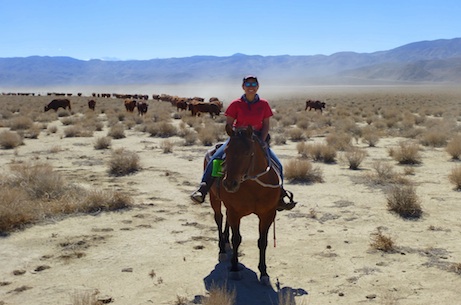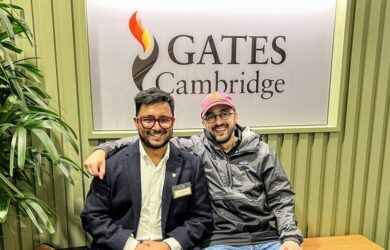
Laura Marcus has spent the last two years living in a remote community where students are actively involved in the education process. She will study how to mainstream some its ideas on democracy.
Laura Marcus was a political activist at high school and got suspended at one point for organising a protest against the Iraq war. The experience pitched her against the school authorities.
However, since leaving she has been working at a remote college where students are fully involved in the decision-making and planning process. Now she wants to study how this model of student agency can be integrated into traditional schools.
Gates Scholar Elect Laura was born in Honolulu and lived there for four years before moving to Indianapolis. She was interested in politics from an early age. At high school she founded a chapter of the Young Democrats and took part in political campaigns. For the Iraq war protest, she led students on a walk-out for which she was suspended. This proved fortuitous since it meant she could attend a city-wide protest where she met other political campaigners and became involved in the 2004 presidential campaign of Howard Dean.
It was also the first time she felt schools as institutions might be her political adversary. “It opened my eyes to the political pressures in my school, but it was a long while before I began to realise that maybe students were part of that political community and could in fact have some say in their education,” she says.
At high school, she also worked for Key Club International, raising money for local charities and volunteering in homeless shelters and nursing homes. Her interest in politics stems in part from her parents [her father is a university administrator; her mother was a doctor] who would talk about politics around the dinner table, from her best friend who was highly political and her social studies teacher at middle school who taught her modern political history.
Intellectual history
When she was 16 she was looking for a summer abroad scheme, but found a year-long course in a rural part of southern India instead. The school offered the international baccalaureate, as her school did. She says it was the first time she saw poverty close up. She returned to her last year at high school and then went straight to Yale where she did a four-year degree, graduating in intellectual history.
While she was there, she was very involved with the Yale Political Union which debated topical issues in a parliamentary style. She became its director of development and vice president and is still on its alumni board. She says her time at Yale immersed her in a more intellectual, less activist approach to politics. “Activism can be limiting as you are talking to the same people about the same issues. In the Yale Political Union I found people who really challenged me on my political beliefs and made me question things I took for granted. It was invaluable,” she says.
When she graduated, it was the middle of the recession. Laura, who is a keen hiker and had worked as a park ranger, found a job at a small environmental non-profit organisation in Washington DC. The organisation worked with embassies and international legislators on regional environmental issues and organised international conferences, for instance, a conference in South Africa on transboundary conservation. She stayed in DC for two years.
Deep Springs
At high school she had discovered Deep Springs College, which was set up in 1917 and offers a more democratic approach to education. She contacted them at the time to ask if they had plans to accept women since it was all male. They said they didn’t so she forgot about it until she was discussing it with a friend at Yale. “I was fascinated by its education model,” she says.
She and her friends talked about founding a similar college which admitted women and Laura emailed the director of Deep Springs College to let them know. He emailed back and put her in touch with an alumnus who wanted to do something similar and they brainstormed together. Shortly afterwards, Deep Springs College’s Board of Trustees voted to transition to becoming a co-educational institution. In Spring 2012 Laura visited the College and discussed the possibility of her working there. She was very impressed by what she saw.
She says: “What drew me to Deep Springs College was the feeling that what the students did mattered to people outside themselves. When I was at school if I didn’t do my homework, the worst that would happen is that I would get a bad grade. That was as far as the stakes went. At Deep Springs College if someone doesn’t show up to do their work the whole community suffers. Students do a lot of the College’s work and hold each other to account. You have to do tasks that are your responsibility and you can see how others will be affected if you don’t do them.”
The College follows a liberal arts curriculum and is for two years only. Students can then transfer to other institutions. There are teaching staff in social sciences, science and the humanities as well as visiting staff in other areas. Most classes take the form of a seminar and are based on student-led discussions. A lot of the natural science classes are field-based. “It’s very participatory, very experiential,” says Laura. The College is very remote, based in “the middle of nowhere” in California. “There are 45 people in a valley the size of Manhattan,” says Laura. “There are all the joys and frustrations of a small close-knit community. The students are fabulously bright and very motivated, and the community exceptionally warm, but you have no privacy. All in all, though, it has been a very, very worthwhile experience.”
All male
Two years after she started work there, the College is, however, still all male and has been embroiled in litigation, which Laura has been working on, after an alumnus challenged the transition to a co-educational institution. His argument was that the original deed of trust – from 1917 – was about educating ‘promising young men’ to be leaders. “We are optimistic that it will eventually be co-ed, but the legal process can be slow,” says Laura.
While the litigation process has been going on, Laura and the alumnus she was in touch with before she arrived at Deep Springs College have set up the Arete Project, which offers a summer programme based on the Deep Springs College model, but totally separate from it. The first two-month programme will take place near San Francisco this summer and 17 students – all women for the first year – have been admitted so far. Many of the staff teaching on it are linked to Deep Springs College.
After the first programme has run, Laura will arrive at the University of Cambridge to start her MPhil in Education. Her ultimate goal is to integrate the democratic structures of Deep Springs College into mainstream education, targeting the age group between high school and college “when people are becoming citizens”. For that she needed some further educational qualifications and some space for reflection. She says the Cambridge course is perfect because of its interdisciplinary focus and concentration on democratic systems outside America. “I want to understand how different communities at different times have understood the purpose of education, how political situations have affected how educational systems are shaped, and how educational systems have fed back into political life,” says Laura.
“Ultimately I want to see how some of the democratic models of schooling I have experienced at Deep Springs College – student participation in decision-making and planning, for instance – can be incorporated into the general school system. The experience of having agency within an institution or community is an invaluable preparation for citizenship.”












